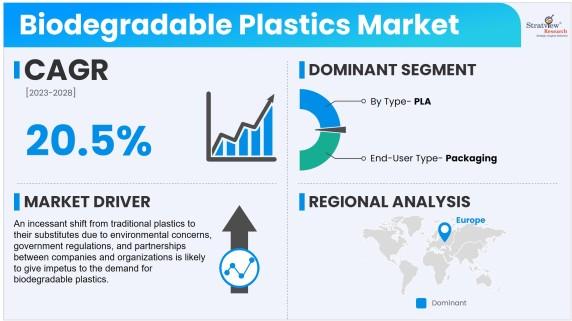Biodegradable Plastics decompose into natural substances like water, carbon dioxide, and biomass when exposed to natural environmental conditions like sunlight, air, and water. These plastics are gaining popularity as a more environmentally friendly substitute for conventional plastics, which are not biodegradable and can harm the environment.
During a conflict, the transportation of goods can be seriously hampered. The biodegradable plastics sector may experience severe delays due to traffic jams, curfews, and other logistical problems. Depending on where the industry is located, the movement of raw materials, manufacturing tools, and final goods may be slowed down or interrupted. Many different basic ingredients are used to create biodegradable plastics. A battle can make it difficult to get raw resources because supply systems are interrupted. This may cause a material scarcity, which would have an impact on how these polymers are made. The crisis may significantly impact the biodegradable plastics business if it depends on raw resources from Ukraine or Russia.
However, the industry is gradually rebounding in the year 2022 with the ramp-up in consumer confidence. Furthermore, an incessant shift from traditional plastics to their substitutes due to environmental concerns, government regulations, and partnerships between companies and organizations is likely to give impetus to the demand for biodegradable plastics.
"The Global Biodegradable Plastics Market will likely rebound at a promising CAGR of 20.5% during the forecast period".
The biodegradable plastics market has been rapidly growing as businesses and consumers alike seek sustainable alternatives to conventional plastics. Rising environmental awareness and regulatory pressures are driving demand for materials that decompose naturally, reducing long-term pollution and minimizing reliance on fossil fuels. Biodegradable plastics, typically derived from renewable resources like cornstarch, potato starch, and polylactic acid (PLA), offer a promising solution for a variety of applications, including packaging, agriculture, and consumer goods.
One of the key factors propelling the growth of this market is the increasing consumer preference for eco-friendly products. Companies across sectors are switching to biodegradable alternatives to meet customer expectations and comply with environmental regulations, particularly in Europe and North America. In the European Union, for instance, strict restrictions on single-use plastics have led to heightened adoption of biodegradable materials. Similar trends are seen in North America, where states like California and New York have enacted bans on plastic bags, driving the demand for biodegradable packaging options.
Despite its growth potential, the biodegradable plastics market faces challenges. Production costs for biodegradable materials remain higher than for conventional plastics, making them less accessible for small and medium-sized enterprises. Additionally, the decomposition of biodegradable plastics requires specific conditions, such as industrial composting, which limits their environmental impact if they end up in regular landfills. Investments in waste management infrastructure are crucial for these materials to fully realize their environmental benefits.
Technological advancements are helping to address these challenges, with innovations aimed at enhancing the biodegradability, performance, and cost-effectiveness of these plastics. For example, researchers are developing bioplastics that break down more efficiently and are capable of handling a wider range of environmental conditions. Additionally, government incentives and funding are supporting R&D efforts in this field, further accelerating the market’s growth.
Asia-Pacific is emerging as a significant player in the biodegradable plastics market, driven by the region's robust manufacturing sector and increasing focus on sustainable development. Countries like China and India are anticipated to witness strong growth in demand for biodegradable plastics as they combat pollution and work toward sustainable urbanization goals.
In conclusion, the biodegradable plastics market represents a vital shift towards sustainable materials in an increasingly eco-conscious world. While challenges such as cost and infrastructure remain, ongoing innovation and support from both private and public sectors are likely to drive continued growth, making biodegradable plastics a key component of the future of sustainable packaging.
To know in detail about the market dynamics, Register Here: https://www.stratviewresearch.com/Request-Sample/3703/biodegradable-plastics-market.html#form



